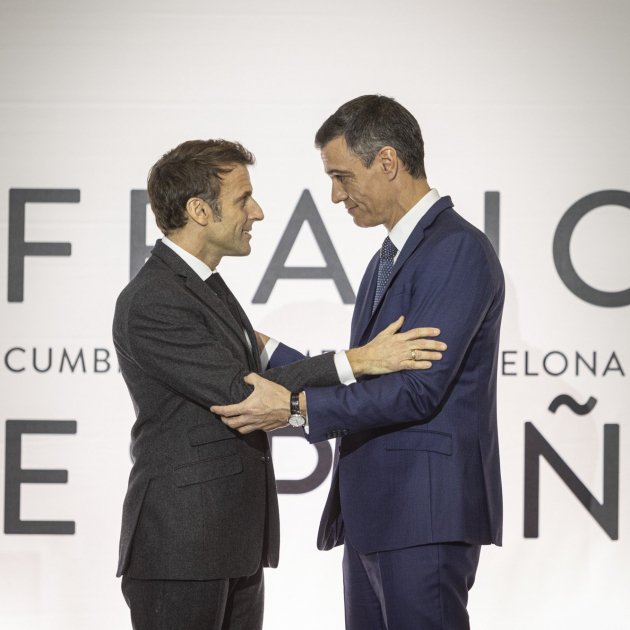The Spanish government considers that it has achieved the objective it set itself by calling the Spanish-French summit in Barcelona. The Spanish prime minister, Pedro Sánchez, criticized the shows of rejection that took place in the city and thanked the Catalan president, Pere Aragonès, who, "unlike other autonomous community presidents", was present for the official reception of the summit participants, from the French and Spanish executives.
"The important thing, in my opinion, is that today the Spanish Constitution is being complied with in each and every one of our territories, also in Barcelona,"Sánchez affirmed when asked about the pro-independence rally that was held a few metres from the meeting venue, the MNAC art museum, and was audible from outside the building while the reception party awaited the arrival of the president of the French republic, Emmanuel Macron.
Not only that, the Spanish PM emphasized that Spain's Constitution defends the right to peaceful demonstration even when one is expressing oneself against it, as happened today in Barcelona, and he grouped the rally called by Catalan independentist organizations with another that will be held against him on Saturday in Madrid, promoted by the far right. "Between what happened today, Thursday, and what will happen in Madrid on Saturday, is where the vast majority of this country is, both in Catalonia and in Spain, which is in support of a Spain united in its diversity", he replied.
Thanks to Aragonès
With regard to the gesture of president Aragonès in leaving the reception of the summit participants before the national anthems of the two countries were played, Sánchez not only denied that it was at all important, but went further and thanked Aragonès as many as three times for coming to Montjuïc to receive them. "I appreciate it. In other summits we haven't even had the regional president", he affirmed in reference to the Galician president, Alfonso Rueda, who last October did not attend the summit with Germany, held in A Coruña, or the systematic absence of the Madrid president, Isabel Díaz Ayuso (People's Party), when convoked for such occasions by the Spanish government. Sánchez did not explicitly cite these examples, but government sources mentioned them during the summit. "I would have liked [Aragonès] to have stayed, but I appreciate that, unlike other autonomous community presidents, he was present," he reiterated.
Recognition of Barcelona
Within the strategy of "re-encounter" that he has deployed in Catalonia for many months, Sánchez took advantage of the signing of the bilateral French-Spanish treaty, which will be known as the Treaty of Barcelona, to recognize the city, and argue that the holding of the summit in the Catalan capital "is a tribute of respect, consideration and admiration to this city". Nothing is accidental, according to the PM, who placed this "tribute" in a context of announcements of investments, in digital and ecological sectors, such as the arrival of the US microchip company Cisco which was announced last November.
The president asserted that behind such developments as these is the social climate that is currently being experienced in Catalonia, but at the same time he acknowledged the deficits in investment and projection that the city has suffered from the Spanish state. "This has a lot to do with Barcelona's commitment to social harmony and concord. It is a demand, which out of respect and consideration and admiration for Barcelona that, for years, and with justification, has complained that the central administration of the state and the Spanish government have not committed themselves to it either with resources or in collaboration or in their international visibility", he replied; no doubt, with an eye on the municipal elections coming up in May.
